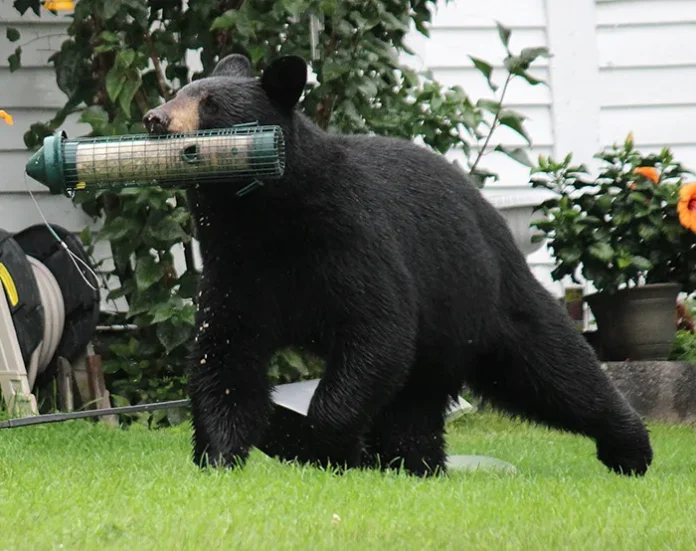Residents raising backyard poultry or feeding wild birds are being asked to do their part to prevent bear–human conflicts this summer and into the fall. Despite an abundance of natural foods currently available, backyard poultry and bird feeders remain highly tempting food attractants for bears. Black oil sunflower seeds contain more fat and protein than any natural food a bear can find in the wild, and domestic poultry—though easily protected with electric fencing—is equally enticing to a hungry bear.
“Overall, bear–human conflict reports have been average this spring, but we have seen an increase in the number of bears being shot by chicken owners. This is unfortunate, especially given the conflict abatement assistance available to the public in New Hampshire,” said Dan Bailey, Bear Project Leader for the New Hampshire Fish and Game Department. “If you raise poultry, invest in electric fencing to protect your birds. Biologists from Fish and Game and the U.S. Department of Agriculture Wildlife Services loan out over 100 electric fences each summer to protect poultry from bear damage. The program also demonstrates the effectiveness of this equipment to encourage poultry owners to invest in their own fencing. Electric fencing is available at a variety of agricultural supply stores and is not prohibitively expensive. Shooting bears and other wildlife attracted to poultry is a short-term, cyclical approach rather than a long-term solution.”
The presence of bears at bird feeders is another important issue, and it has been widely discussed on social media in recent weeks. “Some people believe that only putting feeders out during the day or elevating them beyond a bear’s reach is sufficient, but neither method works,” said Bailey. “Bears will visit feeders during daylight hours, and they are also attracted to spilled seed under elevated feeders. While we appreciate the public’s desire to attract and observe birds, this practice is ultimately detrimental to bears. People and bears can coexist successfully, but doing so requires increased human responsibility to eliminate food attractants, especially bird feeders. Consider natural plantings, a birdbath, or another water source to attract and benefit wild birds during the summer.”
To help coexist with bears and prevent conflicts, follow these steps:
- Stop feeding wild birds by April 1. If you live south of the White Mountains, consider removing bird feeders by March 15 or as soon as spring-like conditions begin, whichever comes first, as seasonal conditions vary throughout the state.
- Clean up any spilled birdseed and dispose of it in a secure trash container.
- Protect poultry and livestock with electric fencing. Invest in equipment that provides long-term solutions to ongoing issues.
- Secure all garbage in airtight containers stored inside a garage or suitable storage area. Place garbage out on the morning of pickup, not the night before. If using a dumpster, request one with metal locking tops and doors that are inaccessible to bears and other wildlife.
- Never place meat scraps in your compost pile.
- Do not leave pet food dishes outside overnight.
- Clean and store outdoor grills after each use.
- Never deliberately feed bears. Doing so encourages reliance on human-related food sources, which alters their natural behavior and reduces their chance of survival.
- Always use a food storage container when camping or hiking in the backcountry.
- When camping in front-country (car-accessible) areas, secure food in a locked vehicle or outbuilding.
For more information on living responsibly with black bears, visit: https://bearwise.org/
If you have questions about bear-related issues, contact the NH Fish and Game Department’s Wildlife Division at (603) 271-2461.
